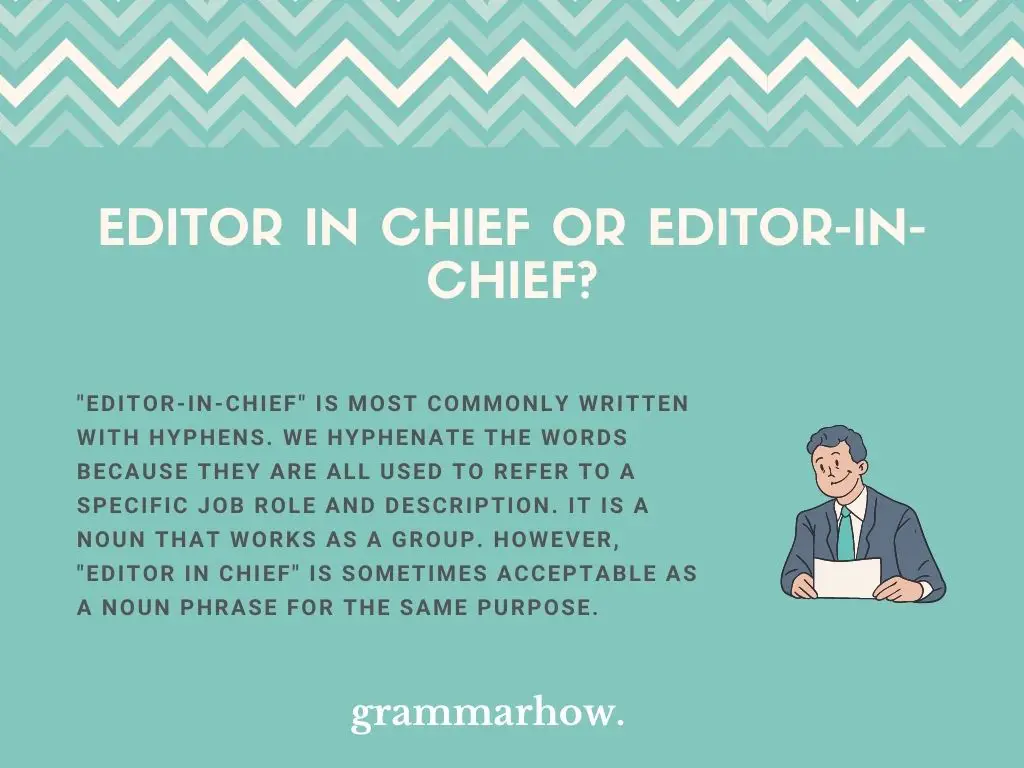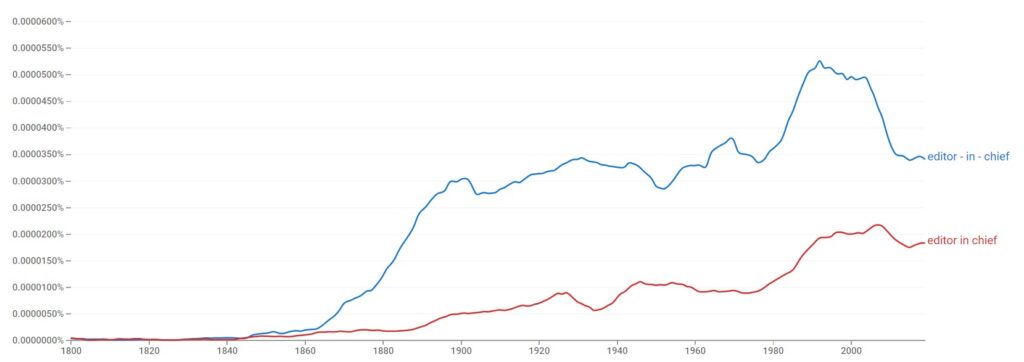“Editor-in-chief” is a job title given to the editor who directly controls a publication. However, we need to know whether it’s a hyphenated word or whether we can split it into more than one or two words. This article will help you to answer that.
Editor in chief vs. Editor-in-chief
“Editor-in-chief” is most commonly written with hyphens. We hyphenate the words because they are all used to refer to a specific job role and description. It is a noun that works as a group. However, “editor in chief” is sometimes acceptable as a noun phrase for the same purpose.

According to Google Ngram Viewer, “editor-in-chief” is the most popular spelling variation. It’s much more likely that we’ll come across it with hyphens than we will with spaces.

However, you might also notice from the graph above that the three-word version “editor in chief” is still somewhat popular. It mainly depends on personal preference, but hyphens are still the most common practice in English.
In The Oxford Dictionary, “editor-in-chief” is officially spelled with the hyphens. It is a noun phrase, but the hyphens allow us to group the three words together to show that they’re all relevant as part of a job title.
However, we could look in another trustworthy dictionary like the Merriam-Webster Dictionary to learn that “editor in chief” is also acceptable with the spaces between the words.
Both options are correct, and personal style or preference will decide which works for you.
Editor in chief
“Editor in chief” is less common than the hyphenated variation. However, it is still perfectly acceptable. We can use it when we are describing someone’s job. Some people like to drop the hyphens because they think it helps with readability and simplicity.
The noun form works the same with or without the hyphens. It’s mostly a stylistic choice that determines which one you use yourself.
These examples should help you to figure it out:
- I am the editor in chief at the publication house, and what I say goes.
- I think you need to hire a new editor in chief. The current one is running amok!
- We need an editor in chief to keep us in line! None of us know what to do anymore.
- The editor in chief told me that I could go ahead with this publication!
We do not need to hyphenate it in all cases. However, since it’s a style choice, it’s wise to remember to write it as either fully hyphenated or fully three words. There’s never a reason to mix the two spelling variations in any of your writing.
Pick one and stick to it.
Editor-in-chief
“Editor-in-chief” is the more common variation to come across. We typically hyphenate the three words because they all work to describe the same job role. Since the job role is only owned by one person, it makes sense to include the hyphens to demonstrate this.
With that said, the hyphens don’t change anything about the flow or pronunciation of the three words. “Editor in chief” and “editor-in-chief” are spoken in the same manner (you do not need to rush if you include hyphens).
Here are some examples of how you can use it:
- We had to sack the editor-in-chief. He wasn’t doing nearly a good enough job.
- You have to find yourself a new editor-in-chief. I don’t want anymore to do with this place.
- Can we look for the editor-in-chief before finalizing this one, please?
- Have you seen the editor-in-chief’s new office? It’s luxurious!
We still use it as a noun in the hyphenated form. It’s still used to describe a job role, just as it is when it’s just a collection of multiple words. The only difference comes from the style you write with.
Is “In-Chief” Capitalized In The Word “Editor-In-Chief”?
You do not typically capitalize “in-chief” when writing “editor-in-chief” because it is not a proper noun. However, if you’re writing it as your job role for an official document, you might find it useful to capitalize all three words to highlight that it is your role.
Also, you might find it useful to capitalize “in-chief” when including it as part of a title. The hyphenation does not treat the three words separately, so it’s acceptable to capitalize each one even though they’re part of the same word.

Martin holds a Master’s degree in Finance and International Business. He has six years of experience in professional communication with clients, executives, and colleagues. Furthermore, he has teaching experience from Aarhus University. Martin has been featured as an expert in communication and teaching on Forbes and Shopify. Read more about Martin here.
